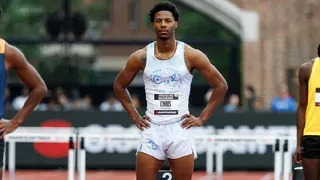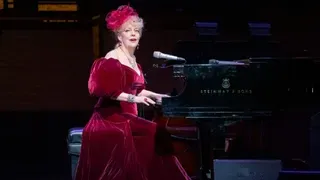December 2, 2015
Riding the 'Great Comet' with Dave Malloy
Robert Nesti READ TIME: 16 MIN.
Dave Malloy came to writing for the theater on a whim. It was the summer of 2000 in San Francisco and he had just dropped out of graduate school where he was studying musical composition. At the time he was supporting himself by working in record stores and "playing electro-jazz in shitty clubs in the Mission," he recalled on his Culturebot blog. Then he did a theater production, then another, then another... for some 8 years making little money, but supporting himself with a variety of jobs, including gigs on cruise ships.
It was on a cruise ship that he became reacquainted with "War and Peace," and in not the usual manner. It turned out that reading the book was a way to maintain a relationship with his land bound girlfriend. "They would call each other to discuss chapters, hoping that sharing a mental space would make up for their not sharing a geographical one," observes Tessa Nelson in the American Repertory Theater's monthly guide published this month. "Malloy loved the novel instantly. He related intimately to the character of Pierre, sharing his bafed sense of wonder at the vastness of the world. For Malloy, the lengthy tome went quickly. 'Parts of it read like a trashy romance novel,'" he said. "'I wanted to adapt it instantly.'"
What challenged the shaggy, affable Malloy was simple: how do you turn such a daunting page-turner into musical. Of course, knowing Malloy, there would be nothing conventional about his musical. He is a self-professed musical theater writer, identifies as part of a community of "experimental, downtown theater artists and musicians, for whom the love of musicals is either nonexistent, highly qualified, or a shameful secret." In other words, if Malloy were to sign up with Disney to write the next "High School Musical," it would use its setting as a backdrop to retell The Odyssey.
Somewhere along the way Malloy developed a keen understanding of the musical theater, as well as great affection for its eclectic sensibilities expressed in a wonderful essay that more or less establishes his renegade sensibilities. "How do we get musicals that break the musical mold?" he asks. Then answers with some suggestions.
"We need composers and singers that come from rock clubs, cabarets, basements, not undergraduate musical theater programs. We need singular, creative musicians, playing music that is inventively arranged and not beholden to any preordained sound. We need to never allow a digital piano to be used again. We need to get more bands out of the pit and onto the stage, so we can see them groove. We need sound designers that blow the rooms up, and we need directors that will let them. We need audiences that will let a missed lyric go.
"But above all, we need authenticity; composers, lyricists, singers, musicians and technicians all doing what they do because they couldn't possibly do it any other way."
What to expect, then, with "Natasha, Pierre & The Great Comet Of 1812" which opens this week at the Loeb Drama Center and runs through January 3, is something unique, immersive and from all reports by those that saw its previous New York incarnations, enthralling. In those productions Malloy's retelling of a portion (some 100 pages of the novel's second "book" of Tolstoi's tome) took place in a makeshift Russian supper club (that was actually modeled on a real Moscow dive that Malloy and his director Rachel Chavkin fell into one inebriated night). There was food - borscht, pierogies and black bread - and drink (ample Vodka) that was consumed while the show played around the audience. (Those that hate to see that fourth wall come down, better be prepared.)
What transpired was a indicative of Malloy's style of mashing up genres, be they theatrical or musical. "(The show) describes itself in its lyrics as both a novel and an opera (and, sure enough, is completely sung) while also incorporating flourishes of a cabaret act, a floor show, a Broadway music drama, and - why not? - a naughty stag party," wrote Jesse Green on New York Magazine's Vulture website.
As for Malloy's through-sung score, don't expect "Les Mis�rables," but a score with pop sensibilities, be they EDM and emo, and allusions to Russian classical and folk music. "While the band of eight includes mostly instruments that might be found in a classical ensemble (cello and viola, clarinet and oboe and piano), the music matches the boho-hip flavor of the sometimes slangy lyrics. It's a blend of contemporary styles only slightly inflected by Russian flavors. The numbers range from yearning ballads in the Broadway-beloved manner of the British invasion to folk-flavored songs redolent of early 1970s Joni Mitchell or 'Hair' (of all unlikely musicals), commented Charles Isherwood in reviewing the show in the New York Times.
And don't think that Malloy is a musical theater snob - he loves "Hair" and "Les Mis�rables," even working as a musical director on a production once, though he removed the synths from the orchestration.
"The Great Comet" was wildly praised and sold-out during its two New York engagements; this ART production marks an even bigger iteration. Set designer Mimi Lien has turned the Loeb into a Russian supper club while retaining its proscenium seating. Some will sit on the stage amidst the actors, others will sit adjacent to ramps and platforms where the action takes place. This new production only begs the question as to whether this is akin to the show's pre-Broadway tryout following the path of other ART produced musicals and plays.
Malloy by the way, is no stranger to the ART. He appeared and co-wrote "Three Pianos," a shaggy exploration of Schubert's song cycle "Winterreise," His production of "Beowulf - A Thousand Years of Baggage," has played Oberon a number of times and last fall "Ghost Quartet," his astonishing song cycle based on horror stories played that theater. It was with that show that this conversation with Malloy begins.
Something completely different
EDGE: You were at Oberon this past fall with 'Ghost Quartet,' which was truly amazing. But I take it 'Great Comet' is something completely different...
Dave Malloy: Most definitely. It's a very different show. I wrote 'Ghost Quartet' as an intentional response to 'Great Comet' because I wanted to do something much, much smaller. 'Great Comet' is an enormous show. We have a cast of 25 people now and the scope of it is a way huger piece.
EDGE: And your interest in 'War and Peace' began on a cruise ship?
Dave Malloy: Yes. I was playing piano on a cruise ship. For about 4-5 years in my early 20s I took gigs on cruise ships and traveling the world while playing big band dance sets in the cruise ship band or playing in the big production shows. Things like that.
EDGE: Have you made any changes since you last did the show in New York?
Dave Malloy: We are looking at some changes right now. We are looking to expand the character of Pierre a little bit. There's a new song for him which has a domino effect in other parts of the show. But mostly little tiny things.
EDGE: You are doing it at the Loeb, which is considerably larger than the other two spaces you have done the show. What kind of challenges are involved in ramping the show up in a bigger space?
Dave Malloy: It's definitely challenging, not just a larger space, but a space that has the architecture of a proscenium house with traditional theater seating. So we are trying to integrate that into our world, which is this more immersive, supper club setting. To that end our supper club is on the stage and there are ramps and platforms in the audience so the action happens all around you no matter where you are sitting.
Inspired by a Moscow nightspot
EDGE: So, will the audience be entering through a different entrance?
Dave Malloy: I couldn't say for sure. (laughs). I know the lobby is a part of the design and you enter through a tunnel or something, but I have no ideas what it is.
EDGE: What came first - reading 'War and Peace' or visiting the supper club in Moscow that inspired the show's immersive concept?
Dave Malloy: I read 'War and Peace' first and tucked this idea away in the back of my head. Then several years later Ars Nova commissioned me to write a piece and I proposed 'War and Peace.' After that, I took a trip to Moscow and saw that club -- Caf� Margarita. I didn't think so when I walked in, but when I stumbled out. After having an entire evening at that club, it was such a memorable night out. There were actually hand-made shakers on the table for the patrons to play along with, so that actually finds its way into our production. We have shakers on our tables.
EDGE: As 'Ghost Quartet' showed, you write songs that convey a mash-up of styles. Where does that come from?
Dave Malloy: It comes from my own taste. I love all styles of music and I tend to be a real eclectic listener. It's not uncommon for me to be listening to EDM music one minute, then classical Russian music the next. So it's just the way my brain hears music. I don't like compartmentalizing things that much. If the dramaturgical moment needs EDM music, then EDM goes into the show. If it needs an indie rock song, than an indie rock song goes into the show.
A trashy romance
EDGE: I think I read somewhere that part of your goal was to make 'War and Peace' accessible to the modern audience because no one talks like they did in 19th century Russia...
Dave Malloy: I never thought of making it accessible. For me the biggest hurdle for people comes with the book's reputation; but I feel that almost anyone I know that has tried to read it comes away with a different take. Tolstoi does all the work for you. It's a trashy romance novel-- total page-turner. It's actually quite easy to read. And what I felt when I read it was that it feels so contemporary. What the characters are going through and are saying to each other are things that I have gone through and have said. These are feelings I've had and things I hear sung about in rock lyrics. A lot of the text is word for word Tolstoi and my own voice comes through at times to comment on it a little bit with a 21st century perspective and to clarify parts of the exposition. For instance, the first song is this sing-along recap of the piece - that's a way of helping the listeners keep the characters straight because this is a complicated Russian novel with a lot of characters to keep track of so I wrote that first song to help with that.
EDGE: Can you discuss your collaboration with Rachel Chavkin?
Dave Malloy: We had worked on a show up at Vassar University. Previously she had seen a show of mine called 'Beowolf,' which has been done a couple of times at Oberon. We got to know each other after that, then she directed this show for students at Vassar. And we had such an easy time working together and felt so aesthetically aligned. Then a few years later when I was working on 'Three Pianos,' my two collaborators and myself realized when we finished the text that we had this sprawling, three-hour piece that needed a director. I had just worked with Rachel at Vassar and just adored her and suggested she come in. She was masterful on that piece. We have been working together ever since. We did this show, then a piece at Lincoln Center called 'Preludes' about Rachmaninoff. Now have a bunch of pieces in the hopper -- a 'Moby Dick,' a Prince Hal -- a lot of things.
Heady projects
EDGE: You appear to be attracted to heady, complicated source material. 'War and Peace,' 'Moby Dick.' What drives you to these projects?
Dave Malloy: I think it's what interested me at the moment. (pause) It's how I research things. If I suddenly got interested in something I wouldn't research it, I would write a play about it; and in writing a play about it, would research it. For me the glut of the things I want to spend a great deal of time working with and dive into. A piece like 'Moby Dick' -- it's a book I read in college, then came back to it a few years later and found the characters and story completely fascinating. There are so many layers to unpack here. This is a piece you can definitely spend a long time with. And I'm learning a lot about whaling and nautical stuff.
EDGE: Will there be a boat and water on stage then?
Dave Malloy: Not sure, but again, it starts from the text. I think 'Moby Dick' will be an immersive piece. And I think the reason for it is that the show is all about the community of the ship. The community that arises on the Pequod. Melville goes on and on about how he feels that the community that arises on a whaling boat is this very Utopian, diverse wonderful community. And we want the audience to feel it. And the other thing about the Moby Dick piece is that it is such a notoriously long novel and there are long stretches where nothing happens, we want to replicate that as well. So I think that the 'Moby Dick' piece is going to be a marathon affair -- an all day theater event with several different parts that will encompass all the different aspects of 'Moby Dick.'
EDGE: What was most striking about 'Ghost Quartet' was the level of detail you brought to the way your music was performed. Everything about it was calculated to get the effect you were hoping to get. Can we expect the same with 'The Great Comet?'
Dave Malloy: Very much so. I do my own orchestrations, which is something very unusual for musical theater. But I started out as a classical composer and that has made me a stickler for all those tiny musical details.
'A wild night?'
EDGE: You've also in some interview called 'The Great Comet' a 'wild night?'...
Dave Malloy: I did. I said that?
EDGE: Maybe you didn't say it. Somebody said you did.
Dave Malloy: Well, whatever. (laughs.) A wild night. It certainly should be an epic experience. Okay. I'll say it. A wild night. Vodka might have something to do with that. We recreate the feeling of this Russian club so we encourage the drinking of vodka throughout. And there's full-throated singing happening all around you. You will be moving your neck around a lot And at the heart of it is this tumultuous love story.
EDGE: Broadway appears to be welcoming divergent talents and projects. Look at 'Fun House' and 'Hamilton.' But is Broadway ready for Dave Malloy?
Dave Malloy: Sure. I don't see why not!
EDGE: Do you hope to take this one to Broadway?
Dave Malloy: Yes. It's definitely would be something that all of us have talked about. I think it would be very exciting to bring it on Broadway. So one of the things we are doing at the Loeb is to try out what it feels like in a larger house and how we could bring that immersive elements into a house that's more traditional. So the DNA of the show is the same, but the size and scope of it is expanding.
His wild existence
EDGE: I just read a piece about you in the ART magazine and what jumped out at me was it says that you have 'lived liberally.' How do you 'live liberally?'
Dave Malloy: (Laughs) What a funny phrase! I have no idea what that means. Maybe it's that I have never worked a 9-to-5 job that I've despised and I am happy about that. I am happy about that. I've worked a lot of odd jobs while making music and working in the theater. I have travelled a lot because of that and have lived in a lot of different people. Maybe that's what that means.
EDGE: I also read that you don't consider yourself a musical snob. Were you ever one?
Dave Malloy: Oh, yes. I think that I outgrew some snobbery. I think I was at one point in my life something of a musical snob. Back in high school and college I didn't listen to much contemporary music -- I would be a jazz snob or a classical snob or a 60s rock snob. Then I eventually out grew those tendencies and now have this very holistic, all embracing musical taste for sure.
"Natasha, Pierre & The Great Comet Of 1812" runs December 6, 2015 - January 3, 2016 at the Loeb Drama Center, 64 Brattle Street, Cambridge, MA. For more information visit the American Repertory Theater website.
Robert Nesti can be reached at [email protected].






